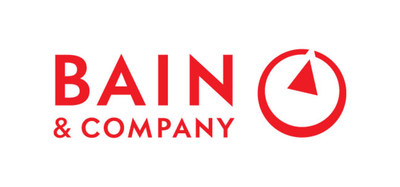Tech-Fueled Growth Poised To Accelerate; Business Strategy Set To Become Tech-Driven Across All Sectors
Press Releases
Sep 20, 2021
SAN FRANCISCO, Sept. 20, 2021 /PRNewswire/ — Technology has cemented itself at the foundation of the global economy over the past decade. Although Covid-19 remains a global threat to economic recovery, extraordinary growth is being fueled by increased and sustained tech-driven innovation.
“Companies that have seen their share prices rise are most often either tech firms or businesses with a tech-led strategy,” said David Crawford, leader of Bain & Company’s Global Technology practice. “Over the last decade, technology has proven itself to be much more than a siloed industry. Instead, tech has become the primary force of disruption and value creation in nearly every industry around the world.”
“Businesses—from ‘born tech’ companies to ‘brick and mortar’—have recognized the outsized benefits of adopting a tech-led strategy in today’s world,” said Anne Hoecker, partner at Bain & Company and head of the firm’s Americas Technology practice. “As we look across the technology landscape, the bottom line is clear: if businesses want to flourish in the current environment, executives must be comfortable with the pace and implications of tech-driven disruption.”
Bain & Company’s second annual global Technology Report, released today, explores the impact of tech on business, consumers, economies, geopolitics and broader society.
Among the themes explored in the report:
Venture capitalists are doubling down on technology
Technology is reshaping the economy, and it starts with venture capital. In recent years, we have seen a clear trend toward tech companies capturing a growing share of venture funding. Bain’s Startup Investment Cruncher database found that, from 2010 through 2020, tech start-ups took in the majority of venture funding across all deals by independent venture capital (VC) firms and corporate venture capitalists. In the first quarter of this year, tech start-ups accounted for nearly 70% of total venture investments.
Venture investments in technology initially declined by 13% between 2018 and 2020—the first decline of its kind since 2012. But tech venture investments came roaring back during the Covid-19 pandemic, with the total value of tech venture investments doubling in the first quarter of 2021 from the same period in 2020. This is more than twice the growth rate of investments in other sectors. The pandemic fueled this growth by accelerating the shift toward later-stage deals that had been underway for several years, increasing the total value of tech deals in the Series C stage or later by 165% year-over-year in the first quarter of 2021.
Artificial intelligence (AI) and cloud technology are proving to be the primary drivers of venture investment interest. Over the past decade, these two segments of technology have grown more than twice as fast as venture investments in all other sectors, and now make up more than one third of total venture investment in technology.
US hyperscaler M&A spending has benefited consumers and enriched market dynamics
Hyperscalers, also known as the tech giants, are the leading cloud tools and service providers globally. Seven major hyperscalers currently dominate the tech landscape: Alphabet, Amazon, Apple, Facebook, and Microsoft in the US, and Alibaba and Tencent in China.
The common narrative is that hyperscalers spell the end for competition. However, Bain has found that most big tech acquisitions in the US benefit consumers and do not hamper competition. Rather, over the last fifteen years, hyperscaler M&A activity has proven to contribute to vibrant markets and create immense value for consumers, according to Bain’s analysis.
Hyperscaler M&A activity represents only a small piece of the overall landscape, with hyperscaler M&A accounting for only 5% of total tech start-up exits within the last year. But according to Bain’s research, most big tech acquisitions end up benefiting consumers in at least one of three ways: by reducing pricing, by increasing access to innovation and by improving products overall.
Bain conducted an analysis of the five US hyperscalers over the last fifteen years. The firm’s analysis of all $300 million-plus acquisitions, between 2005 and 2020, found that 72% of US hyperscaler M&A spending created value for consumers.
Big tech acquisitions have not only pressured incumbents to innovate. These acquisitions have increased market fragmentation, fueled greater venture capital investments and spurred competition between the hyperscalers themselves. This set of insights provides another useful perspective for both acquirers and regulators, as they work to ensure these deals continue to create—not destroy—value.
Tech decoupling will define the future: How the US and China are leading the way
Although the global technology industry will continue to be co-dependent for the foreseeable future, several major countries are now investing more than ever in technology and supply chain independence.
The US and China’s complicated relationship over the last few years has pushed the world in this direction. Over the last several years, the decoupling of the US and China’s economies and technology ecosystems has gained momentum, with both countries making multi-billion-dollar investments in their domestic technological development for the future. China, in fact, plans to spend a whopping $1.4 trillion over the next few years in infrastructure technologies, such as artificial intelligence (AI), semiconductors and 5G networks.
The two nations’ recent moves signal that decoupling will be a defining feature of the technology landscape for years to come. Recent supply chain disruptions, such as the global chip shortage, have only exacerbated these challenges and compounded the desire for self-reliance. According to Bain’s analysis, from 2016 to 2020, technology-related foreign direct investment between the US and China dropped by 96%, creating uncertainty for tech companies around the world and requiring tech executives to be comfortable with constant adaptation. But although decoupling appears all but inevitable, multiple chokepoints assure the global technology industry will remain co-dependent—for now.
The semiconductor equilibrium is shifting
While there has been intense focus on the shortage of semiconductors this year, a fundamental transformation—with even bigger implications for the future of silicon—has picked up momentum: the rise in demand for specialized processors. Fueled by today’s computing environments, this fast-rising demand in specialized processors is shifting an equilibrium between special- and general-purpose (GP) silicon that has existed for decades.
Special-purpose chips, known as application-specific integrated circuits (ASICs), have historically occupied an important, yet smaller, segment in the market than general-purpose chips. However, as hyperscaler cloud service providers (CSPs) continue to design more custom processors in-house, the demand for specialized silicon has increased, blurring the long-standing dynamic between special- and general-purpose processors.
Yet, despite the growth of ASIC providers and the burst of venture funding in specialized silicon vendors, this shift in equilibrium does not spell the end of the general-purpose chip. While special-purpose processors remain difficult to program, the GP model’s flexibility allows it to be desirable in most use cases.
This equilibrium shift, however, opens an opportunity for companies across the semiconductor ecosystem to thrive, if they can commit to being nimble and adaptable in this changing landscape.
Welcome to the new technology economy
This year’s global Technology Report also details the cloud-based computing model’s remarkable impact on the technology industry over the last two decades. Throughout the report, Bain uses its analysis of the cloud technology landscape to deep dive into topics such as software-as-a-service (SaaS) subscription models, artificial intelligence and hybrid cloud adoption.
Other sections of this year’s report explore some of the tech industry’s rising challenges, including the competition for top tech talent, supply chain disruption and regulatory scrutiny across the US and Europe.
Editor’s Note: To arrange an interview, contact Katie Ware at [email protected] or +1 646 562 8102.
About Bain & Company
Bain & Company is a global consultancy that helps the world’s most ambitious change makers define the future.
Across 63 offices in 38 countries, we work alongside our clients as one team with a shared ambition to achieve extraordinary results, outperform the competition, and redefine industries. We complement our tailored, integrated expertise with a vibrant ecosystem of digital innovators to deliver better, faster, and more enduring outcomes. Our 10-year commitment to invest more than $1 billion in pro bono services brings our talent, expertise, and insight to organizations tackling today’s urgent challenges in education, racial equity, social justice, economic development, and the environment. We earned a gold rating from EcoVadis, the leading platform for environmental, social, and ethical performance ratings for global supply chains, putting us in the top 2% among other consulting firms. Since our founding in 1973, we have measured our success by the success of our clients, and we proudly maintain the highest level of client advocacy in the industry.
Media Contact:
Katie Ware
Bain & Company
Tel: +1 646 562 8107
[email protected]
![]() View original content to download multimedia:https://www.prnewswire.com/news-releases/tech-fueled-growth-poised-to-accelerate-business-strategy-set-to-become-tech-driven-across-all-sectors-301380404.html
View original content to download multimedia:https://www.prnewswire.com/news-releases/tech-fueled-growth-poised-to-accelerate-business-strategy-set-to-become-tech-driven-across-all-sectors-301380404.html
SOURCE Bain & Company



